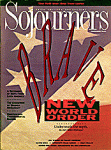The back roads of West Virginia proved to be the place where I began to understand the music on Bruce Cockburn's recent release Nothing But a Burning Light (Sony, 1991). I was driving along Route 33, a winding and spectacular route through the hollers, when it dawned on me. These are frontier songs; they map out new territory.
It's been a long time since Cockburn's last release of new music (Big Circumstance, 1988). Listeners expecting something similar to the likes of "Where the Death Squad Lives" and "Tibetan Side of Town" may need to pack up A Burning Light and head for the back roads to get reacquainted with the faith and politics of this Canadian singer-songwriter. Big Circumstance this is not.
The lead single, "A Dream Like Mine," is a perky made-for-radio offering with Sam Phillips singing background vocals. It is followed by "Kit Carson," in which Cockburn blasts the legendary American frontiersman - "He'd learned to trade in famine, pestilence, and war" - and yet uses his best twangy, haunting electric guitar for accompaniment. The juxtaposition of lyrics and music in "Kit Carson" is our first clue to one of the major themes of this release: We need to know who our real heroes are.
The last four songs on the second side, two of which are instrumental, expand the frontier feel. "Actions Speak Louder," with a guitar melody that conjures up images of frontier days past, was composed as the theme song for the documentary The Greenpeace Years, perhaps helping to create some modern-day heroes. "Indian Wars" is a lament of those oppressed by past frontier "heroes" ("Noble Savage of the cinema screen/An Indian's good when he cannot be seen/And the so-called white so-called race/Digs for itself a pit of disgrace") and features Jackson Browne on resonator guitar and background vocals. Finally, in the autobiographical "Child of the Wind" Cockburn firmly plants himself among the inhabitants of the frontiers of modern culture, declaring, "The best roads of all/Are the ones that aren't certain."
The center point here, the song providing the spark to ignite all the others, is "Soul of a Man." Its lyrics contribute the recording's title phrase "nothing but a burning light" and also, I believe, its inspiration. Cockburn's cover of "Soul of a Man" is described as having been learned from a 1930 recording by Blind Willie Johnson.
Intrigued by this cryptic liner note, I delved into the history of black gospel music to learn more. That rich foray into this spiritual tradition was worthwhile in itself, but it also served to deepen my respect for Bruce Cockburn. He does justice to the 1930 recording (available on Sweeter As the Years Go By, by Blind Willie Johnson, Yazoo Records Corp., 1990), and he even enhances it with resonator guitar and washboard percussion. Most important, by including this song Cockburn offers a powerful reminder of the richness of the spiritualsa tradition to which musicians of faith and politics, and their supporters, owe a deep debt of gratitude. It's important to know who our heroes are.

Got something to say about what you're reading? We value your feedback!